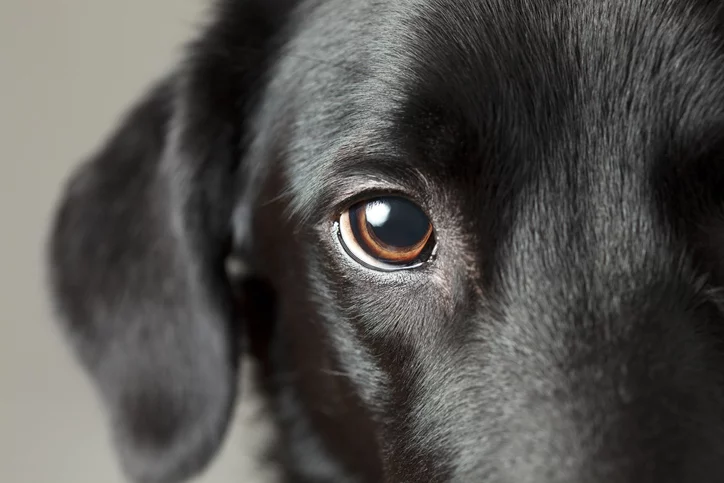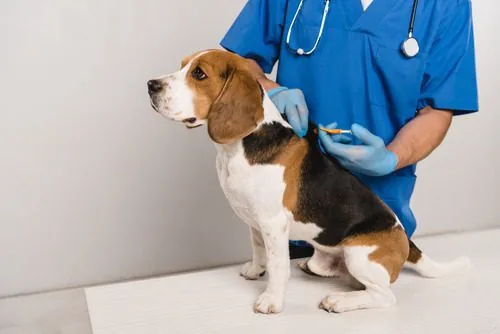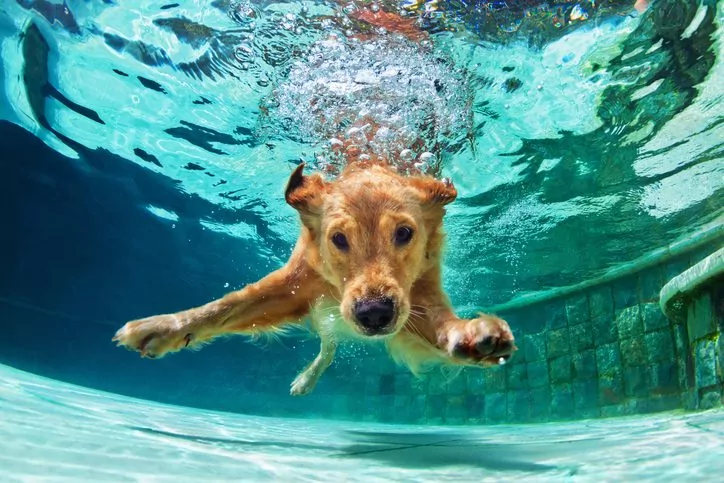7 Causes of Dry Eye in Dogs in Bowling Green, KY
Dry eye is a painful condition with a serious lack of tear production. If you have a breed of dog disposed to dry eye or has any symptoms, take them to the vet immediately. Immune-mediated diseases often cause dry eyes. Allergies can also be a significant factor with this. Dry eye in dogs starts gradually and gets worse over time. However, if you get your dog to the vet soon enough, you can protect your pup from a lot of agonies. Read this article and find out the seven major causes of dry eye in dogs.

What is Dry Eye in Dogs?
Dry eye is a common occurrence in dogs. It occurs when the tear ducts do not make enough tears to lubricate the eye, or their tears are not capable of lubricating. This is caused when something impedes the tear gland’s ability to make a sufficient number of tears to keep the eye moist. The lack of moisture can cause problems for your dog, and if left untreated, they can even go blind. Several things can affect your pup’s tear glands.
What Causes this Condition?
Certain illnesses can cause dry eyes. If you are uncertain that your dog has a dry eye, but you see evidence of a potential problem, you should take your pup to see the vet.
Below are the 7 common causes of dry eye in dogs:
1. Disease
Immune-mediated diseases can affect the tear gland’s ability to produce adequate tears. This situation is the most common cause of eye-related diseases in dogs. Addison’s disease is another illness that can cause eye problems. Systematic diseases, such as canine distemper, can also cause dry eye.
2. Medications
Certain medications can trigger dry eye in your pup. Long-term administration of oral antibiotics that contain sulfonamide can precipitate the dryness in their eyes. If the medication they are taking is for a chronic condition, you will need to consult your vet concerning the best treatment for your dog.
3. Hyperthyroidism
Hyperthyroidism can also cause this condition. Normal tears are replaced with mucus with this illness, which causes dryness. If dry eye is not taken care of in time, the disorder can lead to cornea ulceration. If your pup is diagnosed with hyperthyroidism, you will need to have them tested for dry eye as soon as possible.
4. Allergies
Typically, allergies are not specifically the cause of your dog’s eye dryness. However, they are a trigger that can cause the condition to arise. Some dogs are hypersensitive, which causes the immune system to overreact. This can then lead to an allergic reaction in other body areas, including the eye.
5. Injury
Your dog may have an injury that is not totally damaging to the eye but damaging enough to hinder the appropriate tear production required to keep the eye moist. Your pup may have a scratch on their eye, which can cause dry eye if it is not treated immediately.
6. Neurological Conditions
Neurological disorders can disrupt the performance of the lacrimal glands, which can trigger dry eyes. A loss of nervous tissue to the eye can cause reduced motor function, and your pup might not be able to blink their eyes. Diseases of the nervous system are sometimes seen after trauma.
7. Congenital
All dogs can get dry eye, but certain breeds are more susceptible to it. These include:
- English Spaniels
- Westies
- King Charles Spaniels
- Shih Tzus
- Pugs
- Yorkshire Terriers
- Bulldogs
- Pekingese
- Lhasa Apsos
Veterinary specialists urge pet parents to have these breeds tested regularly for dry eye. Testing ensures that if your dog has the condition, it will be found early enough to be treated before severe problems occur.
What Are the Signs of Dry Eye in Dogs?
Concerning dry eye symptoms, your pup’s eye will become red and inflamed, accompanied by mucus or discharge. Sometimes this can lead to corneal ulceration. This condition can trigger infection, and your pup may even lose their eye if they do not receive proper treatment.
Below are some of the symptoms associated with dry in dogs. These include:
- Swollen red eyes
- Eye pain
- Constant squinting or blinking
- Lack of tears
- Eyes closed
- Thick stringy mucus
- Recurring conjunctivitis
- Dry and dull cornea
- Sensitivity to light
- The third eye emerging
- Eyes appear foggy
There are a plethora of symptoms for this condition. Dry eye can be extremely painful for your pup, and it requires immediate attention from your veterinarian.
Treatment for this Condition
The treatment for dry eye disease depends on the cause. Medical treatments will help your dog re-lubricate their eyes or treat an infection. Most dogs respond well to treatment. Dogs with dry eye often need lifelong treatment, so you need to be diligent about it.
The following are the treatments for dry eye in your pup:
- Artificial Teardrops
- Acetylcysteine
- Antibiotics
- Corticosteroids
- Pilocarpine
- Surgery
- Transposition.
- Lacrimostimulant agents
Contact a Veterinarian in Bowling Green, KY for Dry Eyes in Dogs
Dry eye is a common condition in dogs, primarily breeds more prone to it. As you can see from the information listed above, there are a variety of causes. Thankfully, there is treatment so that your fur baby doesn’t have to suffer. If you notice that your dog is struggling with dry eyes, contact Southcentral Veterinary Services by calling (270) 282-2564. Your pet’s health is very important to us, and our team will be there every step of the way!
Share This
Recent Posts
About Southcentral Veterinary Services
Southcentral Veterinary Services is here to ensure that you and your pet can access a variety of high-quality, progressive medical services. Our aim is to serve our patients and clients with integrity, compassion, and a focus on being your primary family vet.



